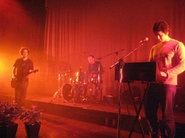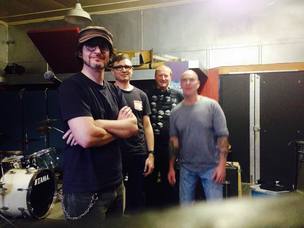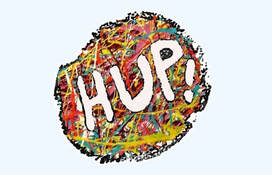 I N T E R V I E W Nick Feisst of The Deadly Deaths by Arpie Shirehorse HUP: How did The Deadly Deaths get together? Before The Deadly Deaths was formed, Tu and I were in a band called Nimbus, and Bevan was a part of Dead Pan Rangers, and we knew each other through the music scene in Hamilton, as well as playing shows together (though, the only one I can remember, off the top of my head, was in Rotorua). I don’t quite remember the order of things, but I had been writing music and recording simple demos for a new group. I showed some of it to a friend (Marshall, who is a musician/producer) in Auckland who gave me some ideas about recording them. Tu and I had seen Bevan at some shows in Hamilton (he had recently returned from a year in Europe with Dead Pan Rangers), and I remember (though I’m starting to doubt my memories) talking to him at the movie theatre in Hamilton about the possibility of drumming with us. We had our first practices in the back room of Bevan’s house in Te Pahu and things seemed to go well. HUP: What was your greatest achievement, as The Deadly Deaths? As a band, probably getting the album finished and released. We didn’t have a lot of gear, and getting everything recorded and mixed was a bit of a challenge. We set ourselves a deadline, and I remember that the final night before we were going to start mixing the last few songs was quite stressful. Tu (I think) and I recorded some of the final vocal takes. I used to do this late at night when it was quiet, as we were recording in the spare bedroom of our flat, with a clothes rack and mattress to try to create some sort of vocal booth and reduce the reverberation in the room. Unfortunately our neighbours also decided to have a loud party this night. We managed to get it all recorded though. For me, personally, it was probably the making of our first music video (for the song “See The World”). I had always been fascinated with stop-motion animation since I was young - so to actually get to try this, read and interact with other animators online, create the puppets, and build the sets, was a very interesting and satisfying challenge for me. It was featured on a number of video sharing websites and even in a couple of small festivals overseas. HUP: What are your best/worst memories about being in The Deadly Deaths?
There were a lot of shows that were fun to play, and a few that weren’t. I managed to drive my car over my guitar after one on a dark and stormy night - and it survived! I remember being quite frustrated that we could never seem to get our music played on bFM in Auckland (though I think we may have been played on a “specialist” show once) - Kiwi FM and all the other student radio stations were very supportive though (I used to call around the stations after sending the latest single out to them, and I would always call Radio One in Dunedin first, because they would always add us). HUP: What was the best show you ever played? I would say the first Camp A Low Hum. I’m not sure that we played particularly well - but the whole experience at the camp was great. We drove to Wellington not really knowing what to expect from the camp. We also released our album for sale at the camp, though I have a feeling that more people bought our shirts (thanks to our designer Heath - who also designed our album artwork) than our album. HUP: Do you feel being based in Hamilton helped or hindered The Deadly Deaths? This is really hard to know. I would like to think that it helped us. The music scene at the time seemed very supportive, and there were a number of people trying to do good things for it (from Nexus, to The Yellow Submarine, etc). HUP: What is your favourite Hamilton music memory? That’s hard to say - there are so many. I arrived in Hamilton in 1999 (and was often confused that year as to the difference between Trinket and Trucker), but was already a fan of Inchworm (who I had seen twice in one night in Rotorua). From this, to the later energetic shows of The Datsuns, the not-so-energetic-but-great shows of Dead Pan Rangers, discovering Daisy Chain Halo, Rumpus Room, and The Shrugs. HUP: How do we 'fix' the Hamilton music scene?! To be honest I’m not even sure what the music scene is like at the moment (I’ve been living overseas). It seems hard to get people interested in local music no matter where you are. I would like to say that a strong radio station would help, but I’m not so sure about this with the way that music is being discovered and consumed by people at the moment. HUP: One final question...any chance of a Deadly Deaths reunion?! If I say 'no chance', it'll probably happen. Who knows? To win a CD copy of The Deadly Deaths album, email us at [email protected] with a reason why The Deadly Deaths should play a Hamilton show again in the next twelve months! For more DD goodness, click here...http://thedeadlydeaths.com/news/
0 Comments
 I N T E R V I E W Scott and Grant Brodie from Grok by Ian Duggan There is a lot of excitement currently about the reformation and upcoming shows by Grok. Grok began in 1991 as a collaboration between brothers Scott Brodie (bass, vocals) from Inchworm and Grant Brodie (keyboards) from Dribbly Cat Attraction, along with Chris Fish (guitar, Korg, 4 track) and Max Ward (drums). Together they took out the Contact 89FM Battle of the Bands competition in 1996, and in 1997 they released their debut CD ‘Bubbles and Noises from the Aquarium’. Grok reformed in London in 2006 – referred to by the band as ‘Grok north’, below – with only Scott Brodie remaining from the original. A major difference was that the songs played live were now improvised (i.e., they are made up on the spot). In the UK the band released an EP and two albums. In 2013 Scott returned to Hamilton, and in the upcoming live shows the band is again comprised of the original members. Here I talk to the Brodie brothers about Grok. HUP: There are some amazing songs on your albums. For example, on the original ‘Bubbles and Noises’ album the song ‘new grok 2’ was a live favourite for many, while ‘Pink Shirt’ from the London based Grok was popular on student radio here in Scott’s absence. So we aren’t going to hear these songs live again? Scott: No... never. Each song is a one-shot affair. The songs found on the Grok north albums were only ever played once and that was what was captured in the studio with the tape running. We live in a world that thrives on repetition. A Grok show is the antithesis of that. HUP: You did a lot of gigs in the UK under this format. I imagine there is some danger it can all go wrong? What is the probability of success and failure? Scott: There's always that danger. But one of our maxims is that there are no mistakes in Grok. We had a bit of a write up in an east London magazine at one stage and they reported the precept as 'there are no mistakes in Gork'; could be good for a T-shirt. The chance that it could go wrong is one thing we are inspired by. At some stage over the years when you play music you lose the butterflies in the stomach, but, with Grok it returns. And it's great. I don't think I could go back to being in a normal band now. And at the end of a song sometimes you all laugh, wondering where did that come from? There has been talk of doing a greatest hits album where we choose the 12 best pop songs from the hundreds of gigs and rehearsals we have recorded on field recorder, then rehearse, go into the studio and bang them out, and never play them again. HUP: Grant, one big difference is that in the early Grok, songs were written and rehearsed, and now they are improvised. How are you, Chris and Max adapting to the new style? Grant: To be honest, the early Grok south stuff was rehearsed but very thinly. From what I can remember the bones of the songs were there from rehearsal but when we played live everything filled out and everything changed. Depending on the night one song could sound completely different one time to the next. So to answer your question, it really wasn't hard and I guess I feel like there wasn't any adapting because it's always been that way in a sense. The mood, the feel and the surroundings all help colour the sound on any particular night. HUP: What about the lyrics, Scott? You must go in with some level of song development? Scott: Hah, I go to my special place. No, it is completely spontaneous. The audience shout out an idea and I imagine some sort of image or narrative and I just sing from that. It's automatism, and it's a technique that improves with practice, and cider. HUP: How easy was it to get song ideas from your audience in the UK? Are you anticipating it might be more challenging getting kiwis to participate? Scott: Well, English audiences are known to be reticent. I think it will be easier to get New Zealanders to respond. Just as long as it isn't about Rugby, whereby I would have to make it an anagram, 'by rug', and do a song about a misanthropic magic carpet. HUP: What are the most interesting lyrics ideas audiences have given you? Scott: The best ones are the less prescriptive ones. Like, “A boat on a lake”. There is lots of places the song can go. HUP: Grant, the early Grok’s sound owed a lot to your keyboards, as did Dribbly Cat Attraction before it, and Tweeter after it. Have you been active in any bands recently, or is this a return to the stage for you? Grant: I haven't been active in bands for a long time. I work with sound and in a studio so that space is filled for me I think. I love sound which is why I do it as a job, so I'm very lucky. I still get to use my synths a lot with work which is great. So I guess I haven't had the longing to play in a band since Tweeter or Inspector Moog [in the early 2000s]. I did and have worked on a couple of Grok north songs over the years in the studio, which was cool to be involved with from over here. But getting back with the guys again has been great. Completely different, but so great, especially with Grok because it really is creating soundscapes in real-time. HUP: In the UK, the band improvised a live soundtrack to the 1922 silent movie ‘Nosferatu’, which sounds awesome. Are you planning similar performances here? And what else can we expect from Grok in the future? Scott: Yes. An improvised soundtrack is on the cards. There's a great silent movie with Lon Chaney in it that I love. It has action, drama, romance and is quite macabre and surreal. Doing a soundtrack is great fun. We are working on (editing and mixing) a Grok north album that was recorded in 2013 at the moment. There could also be a Grok south album at some stage. We do things in our own time and in a haphazard fashion. I like the fact there are currently two creative incarnations of Grok. We will probably still be messing about when we are 70, living on a space station and reaching out to our alien brethren. The future promises absurdity, high-jinks and good times. |
Archives
July 2022
Categories |

 RSS Feed
RSS Feed
